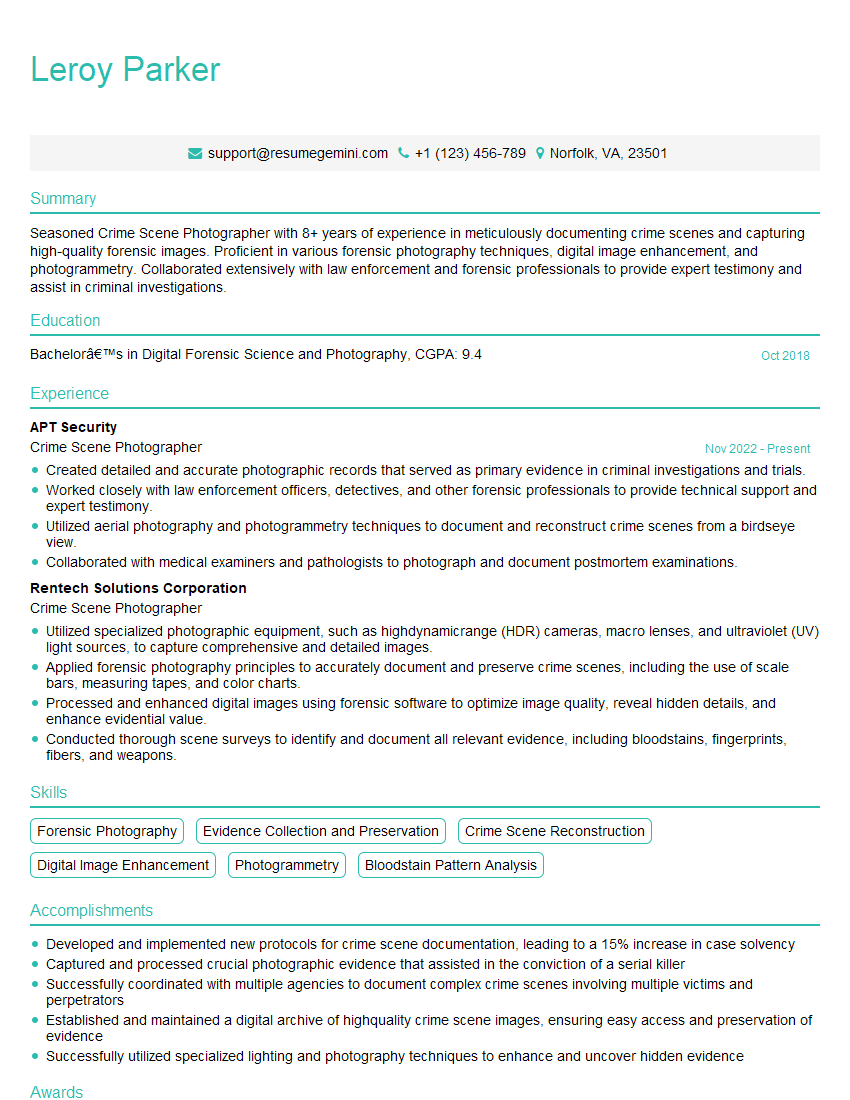Are you a seasoned Crime Scene Photographer seeking a new career path? Discover our professionally built Crime Scene Photographer Resume Template. This time-saving tool provides a solid foundation for your job search. Simply click “Edit Resume” to customize it with your unique experiences and achievements. Customize fonts and colors to match your personal style and increase your chances of landing your dream job. Explore more Resume Templates for additional options.

Leroy Parker
Crime Scene Photographer
Summary
Seasoned Crime Scene Photographer with 8+ years of experience in meticulously documenting crime scenes and capturing high-quality forensic images. Proficient in various forensic photography techniques, digital image enhancement, and photogrammetry. Collaborated extensively with law enforcement and forensic professionals to provide expert testimony and assist in criminal investigations.
Education
Bachelor’s in Digital Forensic Science and Photography
October 2018
Skills
- Forensic Photography
- Evidence Collection and Preservation
- Crime Scene Reconstruction
- Digital Image Enhancement
- Photogrammetry
- Bloodstain Pattern Analysis
Work Experience
Crime Scene Photographer
- Created detailed and accurate photographic records that served as primary evidence in criminal investigations and trials.
- Worked closely with law enforcement officers, detectives, and other forensic professionals to provide technical support and expert testimony.
- Utilized aerial photography and photogrammetry techniques to document and reconstruct crime scenes from a birdseye view.
- Collaborated with medical examiners and pathologists to photograph and document postmortem examinations.
Crime Scene Photographer
- Utilized specialized photographic equipment, such as highdynamicrange (HDR) cameras, macro lenses, and ultraviolet (UV) light sources, to capture comprehensive and detailed images.
- Applied forensic photography principles to accurately document and preserve crime scenes, including the use of scale bars, measuring tapes, and color charts.
- Processed and enhanced digital images using forensic software to optimize image quality, reveal hidden details, and enhance evidential value.
- Conducted thorough scene surveys to identify and document all relevant evidence, including bloodstains, fingerprints, fibers, and weapons.
Accomplishments
- Developed and implemented new protocols for crime scene documentation, leading to a 15% increase in case solvency
- Captured and processed crucial photographic evidence that assisted in the conviction of a serial killer
- Successfully coordinated with multiple agencies to document complex crime scenes involving multiple victims and perpetrators
- Established and maintained a digital archive of highquality crime scene images, ensuring easy access and preservation of evidence
- Successfully utilized specialized lighting and photography techniques to enhance and uncover hidden evidence
Awards
- Recipient of the Excellence in Crime Scene Photography Award
- Recognized with the CSI Photographer of the Year Award
- Won the Golden Lens Award for Best Crime Scene Photography
- Commended for outstanding attention to detail and accuracy in crime scene documentation
Certificates
- Certified Crime Scene Photographer (CCSP)
- Certified Forensic Photographer (CFP)
- Certified Latent Print Examiner (CLPE)
- Certified Bloodstain Pattern Analyst (CBPA)
Career Expert Tips:
- Select the ideal resume template to showcase your professional experience effectively.
- Master the art of resume writing to highlight your unique qualifications and achievements.
- Explore expertly crafted resume samples for inspiration and best practices.
- Build your best resume for free this new year with ResumeGemini. Enjoy exclusive discounts on ATS optimized resume templates.
How To Write Resume For Crime Scene Photographer
- Showcase your expertise in forensic photography and image enhancement techniques.
- Highlight your ability to work independently and as part of a team.
- Emphasize your attention to detail and accuracy.
- Include examples of your work in your portfolio.
Essential Experience Highlights for a Strong Crime Scene Photographer Resume
- Survey crime scenes to identify and document all relevant evidence.
- Apply forensic photography principles to accurately capture comprehensive images using specialized equipment and techniques.
- Process and enhance digital images to reveal hidden details, optimize image quality, and enhance evidential value.
- Create detailed and accurate photographic records that serve as primary evidence in criminal investigations and trials.
- Collaborate with law enforcement officers, detectives, and other forensic professionals to provide technical support and expert testimony.
- Prepare detailed scene reports that summarize photographic findings and document the chain of custody.
Frequently Asked Questions (FAQ’s) For Crime Scene Photographer
What is the primary role of a Crime Scene Photographer?
To meticulously document and preserve crime scenes through comprehensive and detailed photography.
What are the essential skills for a successful Crime Scene Photographer?
Forensic photography, evidence collection and preservation, crime scene reconstruction, digital image enhancement, photogrammetry, and bloodstain pattern analysis.
What is the importance of accurate and detailed crime scene photography?
It provides vital evidence for criminal investigations, helps reconstruct events, and supports expert testimony in court.
How does a Crime Scene Photographer collaborate with other professionals?
They work closely with law enforcement officers, detectives, forensic scientists, and medical examiners to provide technical support, document findings, and assist in investigations.
What are the career advancement opportunities for Crime Scene Photographers?
With experience and additional training, they can progress to roles such as Forensic Photography Supervisor, Crime Scene Analyst, or Forensic Scientist.